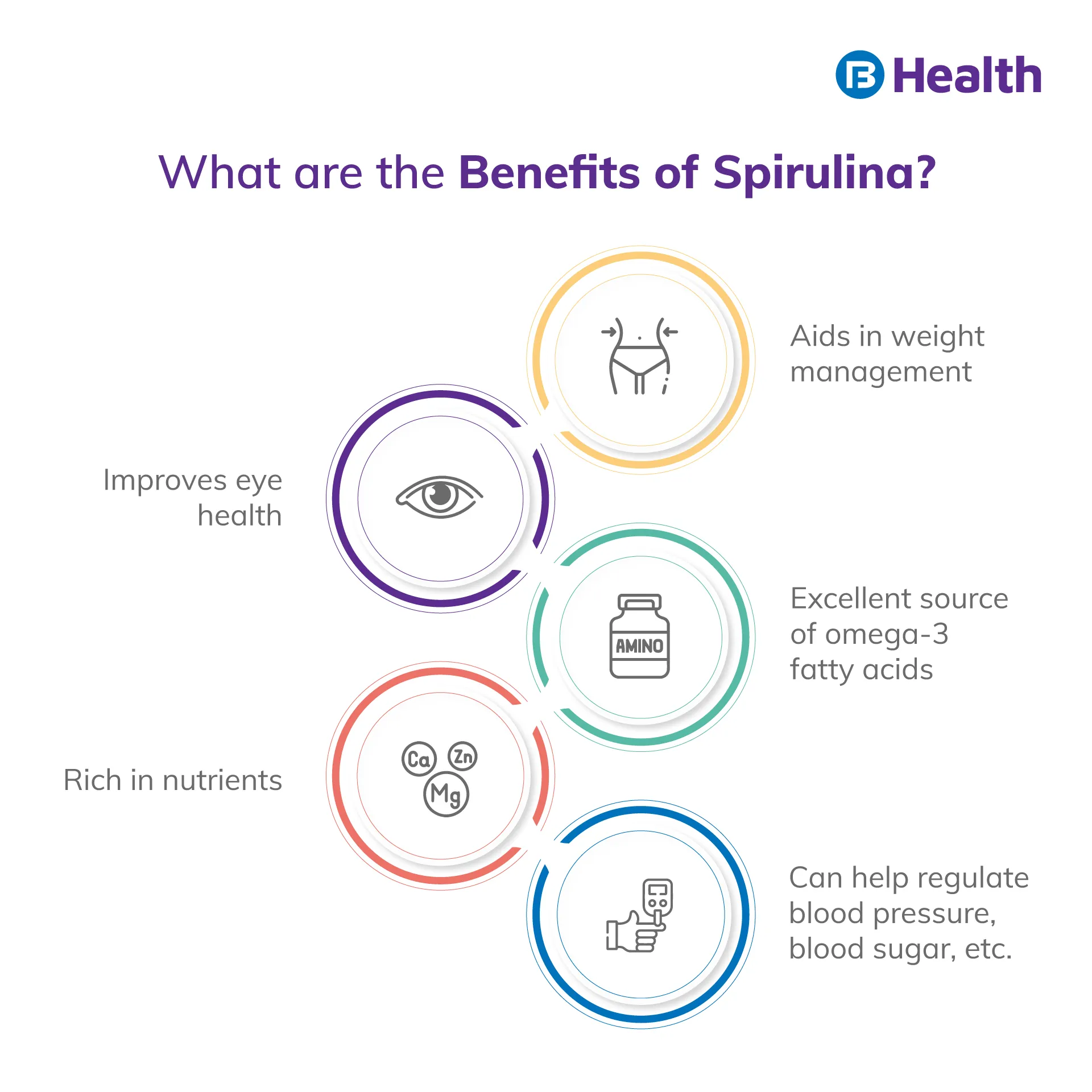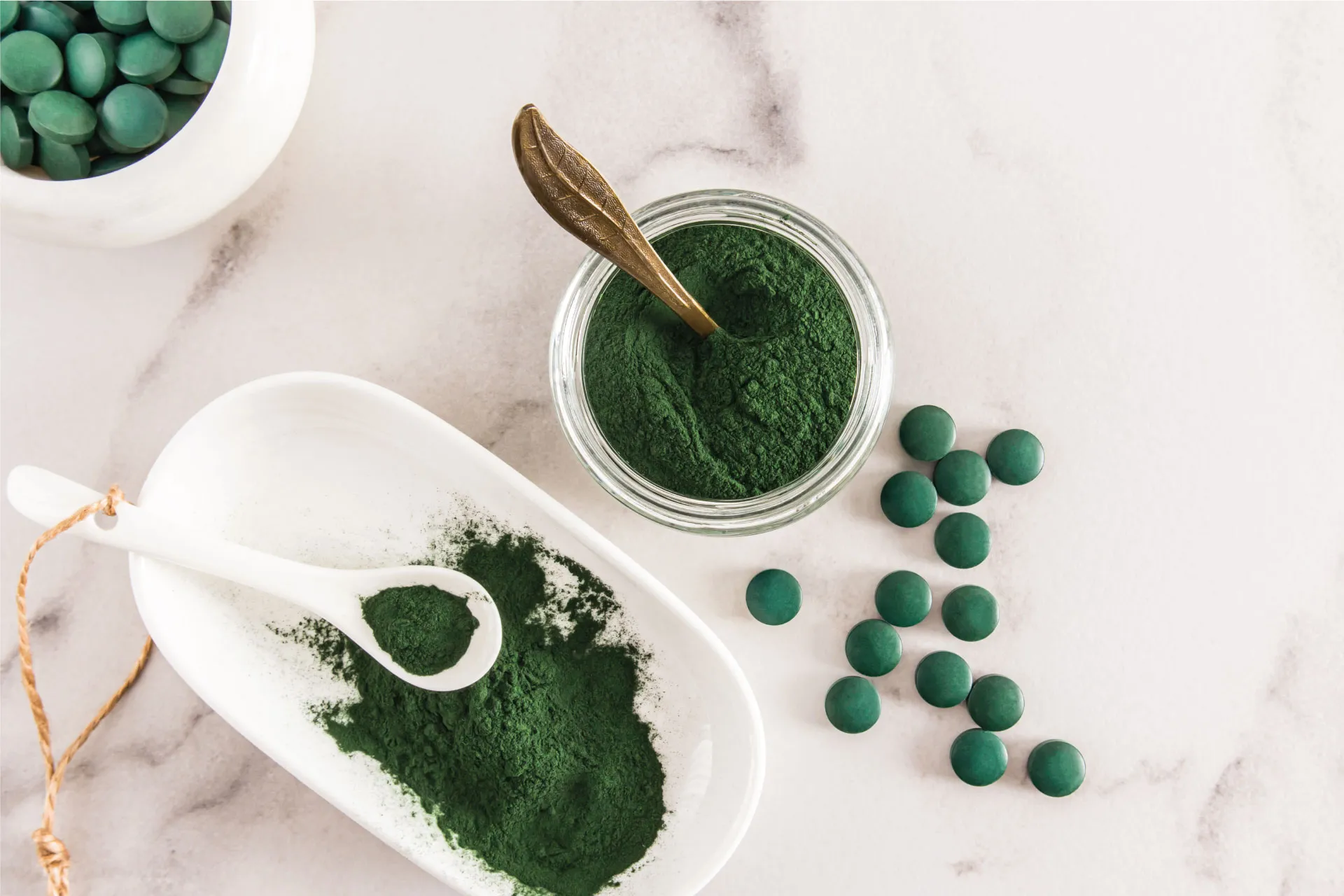Ayurveda | 5 min read
Spirulina: Health Benefits, Side Effects, and Dosage
Medically reviewed by
Table of Content
Synopsis
Spirulina can be called a superfood that can work wonders. Spirulina benefits your eyes, oral health, gut health, and more. However, it also has some side effects. The consumer can experience discomfort after consumption, so a doctor’s consultation is advised before eating.
Key Takeaways
- Spirulina is a powerhouse of nutrients. It contains proteins, carbohydrates, fats, etc.
- Spirulina benefits health in multiple ways, including weight loss
- Always consult with a doctor before starting consumption to avoid any side-effects
What is Spirulina?
It is often touted as a superfood because it is rich in nutrients. It is also a good source of omega-3 fatty acids. Some people take spirulina supplements to boost their intake of nutrients. In addition, Spirulina is also used as a food additive in some energy bars and green smoothies. It is generally safe, but some people may experience side effects such as digestive discomfort, headache, and dizziness. If you are considering taking spirulina supplements, talk to your healthcare provider first to discuss whether it is right for you. Read on more to know all spirulina benefits.
Benefits of Spirulina
Spirulina is a freshwater alga that is often used as a dietary supplement. Spirulina benefits include a rich source of vitamins, minerals, and antioxidants. Here are ten benefits of Spirulina:
1. Boosts Energy Levels
Spirulina is a rich source of iron and vitamin B, essential for energy production. As a result, this superfood has shown improved energy levels, stamina, and general well-being.
2. Improves Digestion
Spirulina is a good source of fibre, which can help improve digestion and bowel movements. It also contains prebiotics, which help promote the growth of beneficial gut bacteria.
Additional Read: Ajwain Benefits and Uses
3. It May Help Lower Blood Pressure
Spirulina contains phycocyanobilin, a compound shown to help lower blood pressure. In addition, spirulina benefits include a rich source of chlorophyll, which has numerous health benefits and can lower blood pressure.
4. Helps Lower Cholesterol
Spirulina contains several compounds that may help lower cholesterol levels. This Spirulina benefit makes it a great addition to any cholesterol-lowering diet.
5. Boosts Immunity
Spirulina is a rich source of Vitamins A, C, and E, all of which are antioxidants that can help boost immunity. In addition, spirulina capsules benefit the body as they contain vitamin C, a known immune booster. Spirulina benefits also include elevated beta-carotene, iron, and magnesium levels, which are essential for a healthy immune system.
6. Helps in Detoxifying the Body
Spirulina contains chlorophyll, a compound that has been shown to help detoxify the body. This nutrient-rich alga promotes detoxification by binding to heavy metals and other toxins in the body and assisting in their removal. Additionally, Spirulina’s high antioxidant concentration can help protect cells and reduce inflammation.
7. Helps Alleviate Allergies
Spirulina may help alleviate allergies by reducing inflammation.
8. Protection against Cancer
Spirulina is a rich source of antioxidants, which may help provide protection against cancer. This is one of the best Spirulina benefits.
9. Improved Brain Health
Spirulina has several health benefits, including improved brain health. Spirulina benefits include being a good source of omega-3 fatty acids essential for brain health.
10. May Help improve athletic performance
Spirulina helps improve athletic performance by increasing energy levels and oxygen uptake.

Side Effects of Spirulina
It is rich in protein and vitamins and has a host of potential health benefits. The most common side effect of Spirulina is an upset stomach. This can occur when the algae are consumed in large quantities or on an empty stomach. To avoid this, start with small doses and increase gradually. If you experience any stomach discomfort, take the supplement with food. Spirulina can also cause headaches and dizziness in some people. These side effects are usually temporary and will go away once your body adjusts to the supplement.
1. Allergic reactions
Some people may be allergic to Spirulina and may experience symptoms like hives, swelling, and difficulty breathing. If you experience any of these symptoms after taking Spirulina, stop taking it immediately and see a doctor.
2. Gastrointestinal distress
Spirulina may cause nausea, vomiting, and diarrhoea in some people.
3. Liver damage
Some people have experienced liver damage after taking spirulina supplements. See a doctor if you experience any liver damage symptoms, such as yellowing skin or eyes, dark urine, or fatigue.
4. High blood pressure
Some people have reported an increase in blood pressure after taking spirulina supplements. If you have any concerns about your blood pressure, talk to your doctor before taking Spirulina.
5. Interactions with medications
Spirulina may interact with some medications, such as blood thinners and immunosuppressants.
Overall, Spirulina is safe for most people, but there are some potential side effects to be aware of.
Additional Read: Home Remedies for Indigestion
Dosage of Spirulina
Spirulina is a type of blue-green algae rich in protein, vitamins, and minerals. It is often touted as a superfood due to its nutrient density and has been used for centuries in traditional medical practices. Today, Spirulina is popular as a dietary supplement and is often included in green smoothies and juices. It is also available in powder, capsule, and tablet form.
How Much Spirulina Should You Take?
The recommended dosage of Spirulina varies depending on the form you take it in and your individual health needs. The recommended dose is 1-3 tablespoons (5-15 grams) per day in powder form. However, Spirulina uses, and consumption indicates that the recommended dose is 2-4 capsules per day. If you are new to Spirulina, starting with a lower dose and increasing gradually as your body adjusts is best. As always, it is advisable to speak with your healthcare provider before starting any new supplement, especially if you have any underlying health conditions.
You can visit Bajaj Finserv Health and book an online consultation to know if Spirulina is good for you.
References
Disclaimer
Please note that this article is solely meant for informational purposes and Bajaj Finserv Health Limited (“BFHL”) does not shoulder any responsibility of the views/advice/information expressed/given by the writer/reviewer/originator. This article should not be considered as a substitute for any medical advice, diagnosis or treatment. Always consult with your trusted physician/qualified healthcare professional to evaluate your medical condition. The above article has been reviewed by a qualified doctor and BFHL is not responsible for any damages for any information or services provided by any third party.



